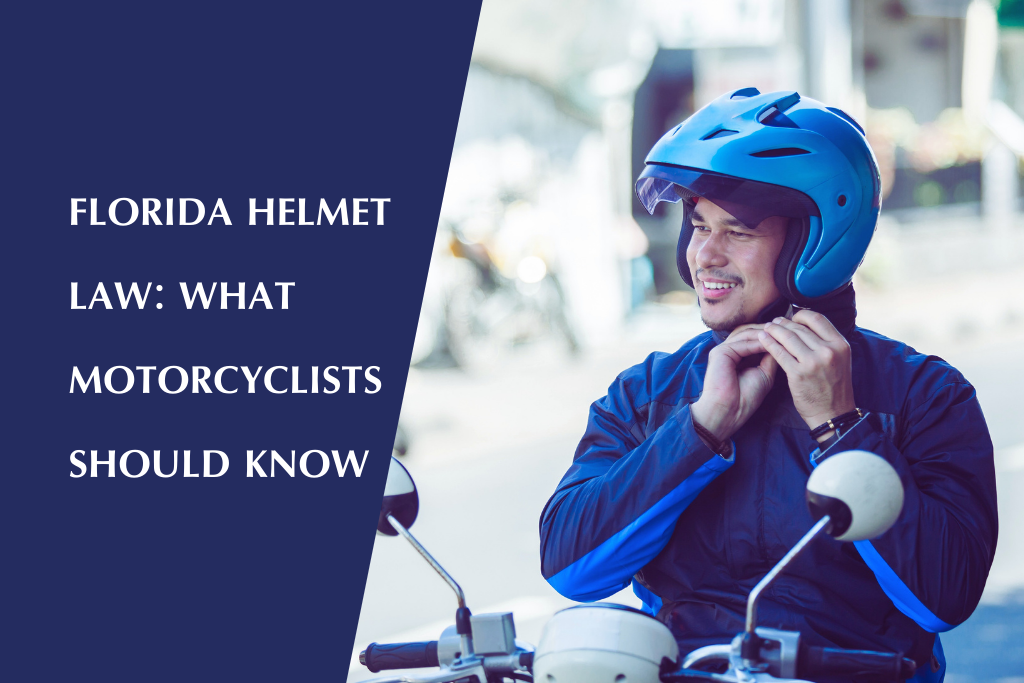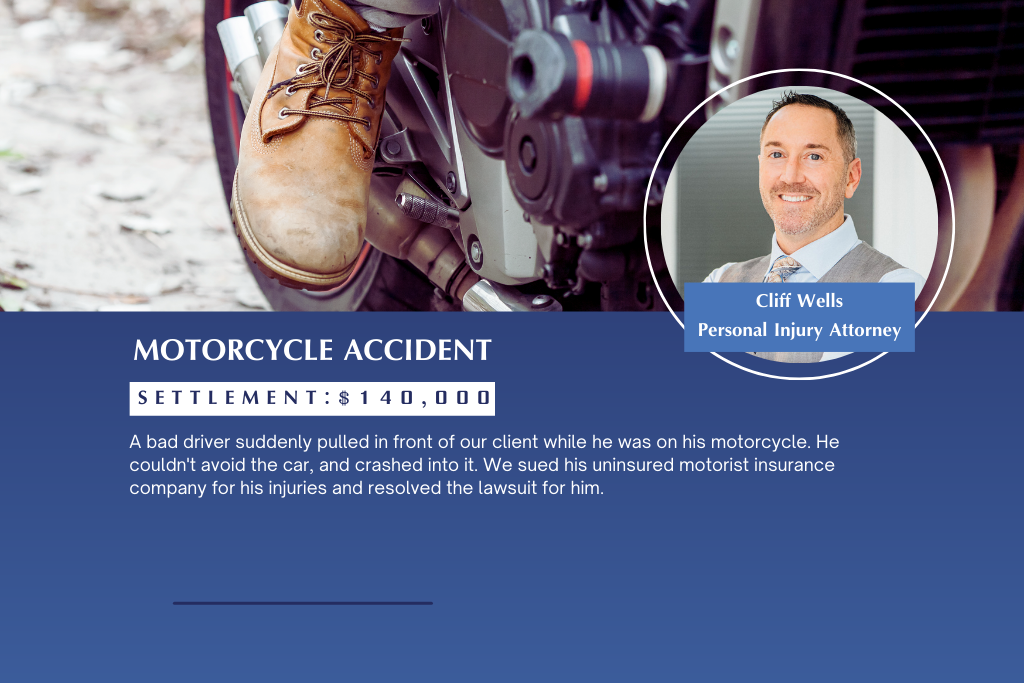With the warm and sunny climate, it is no surprise that Florida is home to many avid motorcyclists. A 2020 census showed there were 620,077 registered motorcyclists in Florida. Motorcycles are inherently intriguing given the heightened level of risk and reward they represent. The experience of riding a motorcycle on the open road is incredible, but an accident can easily be deadly for even the most skilled riders. Motorcyclists and passengers are more vulnerable to injuries without airbags and a metal frame of an automobile. Furthermore, motorcycles are small and are susceptible to being in the blind spot of other drivers. In order to help keep more motorcyclists safe, Florida established a helmet law. But does it work?

Over the years, Florida’s laws have changed significantly, including those related to motorcycle helmet laws. Does a rider have to wear a helmet when riding a motorcycle? When a motorcyclist is injured in an accident, how does not wearing a helmet affect their claim? After being involved in a serious motorcycle accident, the Florida helmet law could have an impact on a rider’s personal injury claim. If you own a motorcycle in Florida, we created this resource for you!
Also, keep Herman & Wells in mind if you or someone you know is injured in a motorcycle accident in Florida. Call (727) 821-3195 or use the contact form to request a free legal consultation with one of our personal injury lawyers. This is an opportunity to speak to an experienced attorney about your situation, ask questions about what to expect moving forward and learn what level of compensation you are entitled to for your claim.
The Cliff Notes: Key Takeaways From This Post
We laid out facts about the Florida Helmet Law; however, here are the key bullet points if you are in a rush:
- In Florida, it is illegal to ride a motorcycle without a helmet.
- Motorcycle riders must comply with Federal Motor Vehicle Safety Standard 218 and are subject to fines.
- Exceptions include enclosed cabs, riders under the age of 16 operating a motorcycle of less than 50 cc or who will not exceed 30 mph on level ground.
- In addition to helmets, passengers and motorcyclists must also wear proper eye protection when riding on public roads.
- Motorcycle accident statistics have revealed that riders have been injured and killed more often than passengers and that there tends to be fewer fatal accidents when DOT-compliant helmets are worn.
- If an adult rider does not wear a helmet, they must show proof that their injuries will be covered up to $10,000 if involved in an accident.
- Not wearing a helmet may result in reduced compensation from a court of law if it is determined that the victim’s injuries could have been avoided if one were worn.
Can You Ride a Motorcycle Without a Helmet Legally in Florida?
The short answer is “no”. Motorcycle riders in Florida are not subject to criminal penalties for riding without helmets. Instead, they receive a ticket and must pay a fine. Under Florida Statute *316.211, anyone riding or operating a motorcycle must wear protective headgear with subsections that indicate exceptions we’ll discuss in the next section. Helmets must comply with Federal Motor Vehicle Safety Standard 218. Enclosed cabs are exempt from this law. In addition, riders under the age of 16 who are operating a motorcycle of less than 50 cc or who will not exceed 30 mph on level ground are not covered by the law.
The History of Florida’s Helmet Law
Florida’s current motorcycle helmet law was passed on June 16, 2000, and it took effect on July 1, 2000. As a law that has been around for over 18 years, it’s unlike many others in the country. Several states require helmets for minors and young adults, but not for adults. Under § 316.211(3)(b), Fla. Stat., passengers and riders over 21 can forego a helmet, but they must show proof that their injuries would be covered up to $10,000 if involved in an accident. The first motorcycle helmet law dates back to the late 1960s or early 1970s in many states. Many states enacted motorcycle helmet laws during this time period, and federal safety standards increased. In the late 1990s, these laws remained in effect, but movements for more freedom led to their repeal. The belief among bikers was that if they didn’t wear a helmet, they could only hurt themselves, and the government shouldn’t be so paternalistic.
On December 8th, 1995, a court in Florida ruled part of the helmet law unconstitutional. According to the Florida v. Raynal court, parts of the helmet law were unconstitutional because they were too vague. It was in that case that the plaintiff challenged a ticket for not wearing a helmet, and the court dismissed the ticket as unconstitutional upon closer inspection. As a result, the Florida police continued to enforce this law regardless of its unconstitutionality, and later cases continued to challenge tickets for violating the helmet requirement. The rest of the statute was declared unconstitutional by the court in Florida v. Landry on May 8, 1996. In 2000, then-Governor Jeb Bush signed into law a new helmet statute to replace the old one. Since it allows adult riders to leave their helmets at home, but it also requires them to carry insurance that will cover their injuries if they get hurt, it is a bit of a compromise.
Florida Motorcycle Helmet & Accident Statistics
There is plenty of data on motorcycle accidents in Florida due to the sheer amount of incidents that occur. We examined factors including injury type, helmet use, county, and how Florida compares with the rest of the country, in addition to the total number of motorcycle accidents. Injuries and motorcycle accidents decreased between 2018 and 2020, but fatalities increased. Consequently, there were more motorcycle accidents resulting in fatalities. Statistically, motorcyclists have been injured and killed far more often than passengers in motorcycle accidents in 2020. This is understandable, since not every motorcycle accident involves passengers. Additionally, both drivers and passengers sustained the most non-incapacitating injuries.
- During the last three years, Miami-Dade had an average of 1,004 motorcycle accidents, the Florida county with the most.
- Despite the possibility that this data represents the number of residents per county, it does not follow this ratio exactly. Lee County is among the top 10 largest counties in the nation. These counties are among the largest in Florida but didn’t make the list. That means there are fewer motorcycle accidents than the national average.
- Volusia County, on the other hand, made the list but isn’t among the top 10 largest counties, which means it has a higher percentage of motorcycle accidents than other counties.
Motorcyclists are advised to wear DOT-Compliant helmets, which have been approved by the Department of Transportation. There is a sticker on the back of helmets that says “DOT” as well as the manufacturer and/or model number. Fit is of utmost importance when it comes to providing proper protection. Safety gear like thick jackets, pants, boots, and gloves can also protect you in the event of an accident. Furthermore, there were 13 fatal motorcycle accidents where non-DOT-compliant helmets were worn, as well as 8 fatal motorcycle accidents where helmet use was not specified. Statistically, motorcycle passengers who were involved in an accident were less likely to wear helmets than drivers. In addition, there were 3 passenger fatalities in which helmet use was not specified and 2 fatalities in which passengers wore helmets not compliant with DOT regulations.

Helmet Law Requirements for Passengers & Minors
The motorcycle laws in Florida can be complicated due to their many facets. As mentioned earlier, according to Florida law, all motorcycle operators are required to wear a helmet that meets all Federal Motorcycle Traffic Safety Standards. You can, however, get away without wearing a helmet if you are over 21 if you have proof that your insurance policy provides at least $10,000 in medical benefits. Florida law mandates that all motorcycle riders under the age of 21 wear a helmet. Passengers, regardless of age, are required to wear proper eye protection when riding on public roads.
Are There Other Equipment Requirements For Motorcyclists Under Florida Law?
According to Florida’s motorcycle helmet law, all operators and riders must wear eye protection. As opposed to the helmet law, there is no exception based on age or insurance. Eye protection is mandatory for everyone.
Florida Motorcyclists Should Also Invest in UM Coverage
5 Reasons “Not” to Wear a Motorcycle Helmet in Florida
Perhaps you’ve noticed some riders who seem unwilling to wear helmets. For anyone who didn’t know why motorcycle helmets aren’t worn, here are some reasons some may choose to not wear one.
Living is not enjoyable for you…
Approximately 1,859 lives were saved by motorcycle helmets in 2016. The number of lives that could have been saved if every rider had worn a helmet in 2016 would have increased by 802. These statistics should show why wearing a motorcycle helmet gives you the best chance of staying alive while you ride. You can still have a great experience riding your motorcycle and still be able to return home to see family and friends. Wearing a helmet reduces the risk of death by 37%. It’s obvious, wear a helmet if you like riding and living life.
Reducing Our Shared Economic Burden Doesn’t Interest You
Yes, wearing a helmet when riding reduces economic costs. Medical costs, legal and court fees, ambulance costs, insurance administration fees, congestion fees, and property damage are some of these costs. If all riders wore helmets, the USA could save more than $1 billion on the mentioned economic costs each year. There’s a lot of money that could be saved if you strapped on a helmet before getting on your bike. $1 billion more per year could make a big difference overall.
The Risk of Fatal Head Injury Doesn’t Bother You
Perhaps you think there’s nothing better than sustaining a head injury…? Concussions, loss of consciousness, skull fractures, and/or severe brain injury aren’t things anyone wants to experience. Whenever you wear a helmet, you reduce your chances of suffering a major head injury and potentially ruining your life. Besides preventing your life from being lost to a severe head injury, it can also spare you from permanent brain damage. The risk of a fatal head injury is reduced by 69% when wearing a helmet.
You Prefer to Look Cool, No Matter What
Helmets look pretty cool to us. You can choose from a variety of awesome-looking open face, half, dual-sport, and any other type of helmet. For anyone who wants to make sure they have the most protection, we recommend getting a full-face helmet. In addition to having most of the coolest styles, you also get the most protection in an accident.
You Don’t Get Any Enjoyment From Riding Without Feeling the Wind in Your Hair
Reasons like these are simply excuses. There is plenty of air flow in helmets today, especially the newer ones. In the Florida heat, if you’re wearing full gear, you’re more likely to sweat more. However, there are options that are designed to help with airflow, heat, and sweating. With different vent sections and padding types, the padding inside helmets is made to keep dry even when sweating.
Ultimately, there are no good reasons not to wear a motorcycle helmet when riding. A helmet can save your life, helps save a lot of money, reduces the chances of sustaining a fatal head injury, and you can still look great while wearing one. Helmets have an ample supply of air flow, so you can still enjoy the weather.
How Helmets (or Lack Thereof) Impact Motorcycle Accident Claims in Florida
Even though it may be legal to ride a motorcycle in Florida without a helmet, it can still hurt your chances of recovering compensation in the event of an accident. Courts will hear both sides’ arguments and claims during any auto accident lawsuit and determine which party was at fault. Each of the at-fault parties will share the blame in cases involving multiple at-fault drivers. In some instances, this may also involve assigning blame to the victim. A court could consider that the fact you were not wearing a helmet was a contributing cause of your injuries if you were involved in a motorcycle accident. If the court determines that your injuries may have been avoided if you had worn a helmet, you may be held accountable for a percentage of the accident. This percentage of fault will typically reduce the compensation you receive from a court of law.
Contact Our Motorcycle Accident Lawyers If You Get Injured in Florida
Still have questions? Get in touch with our motorcycle accident attorneys at Herman & Wells located in Pinellas Park and Sarasota. Cliff Wells, one of our co-founders, has extensive experience with personal injury cases involving motorcyclists and an avid motorcyclist himself. Cliff is an excellent resource for anyone with questions regarding motorcycle accident proceedings. Call us today to schedule a free consultation.

